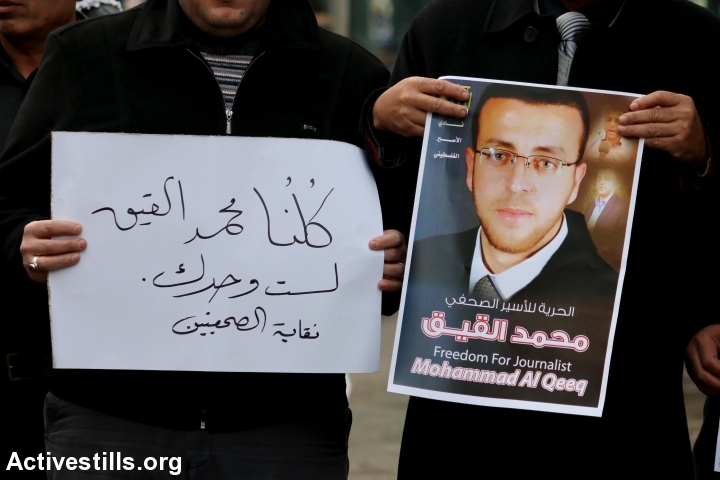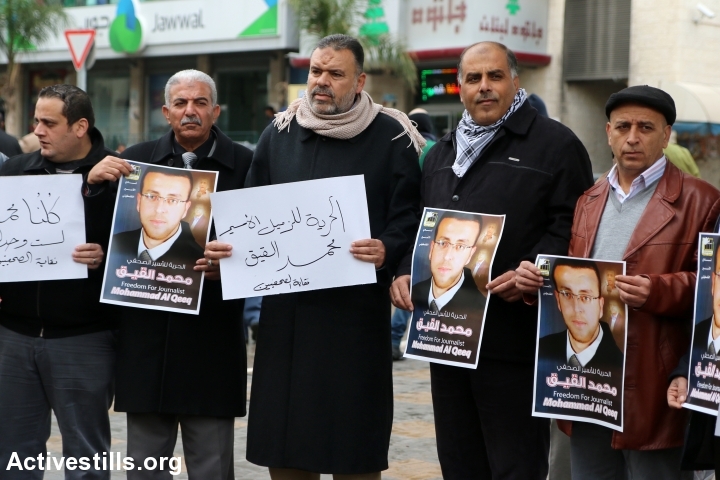Palestinian journalist Muhammad al-Qiq, who began his hunger strike 60 days ago, claims hospital staff have been forcing him to receive liquids intravenously against his will.
By Noam Rotem (translated by Einat Adar)

In Afula’s Haemek Medical Center, a 33-year-old Palestinian journalist Muhammad al-Qiq is being shackled to his bed 24 hours a day. Next to him stand two prison guards. Although it is unclear what he is being accused of, al-Qiq was put under administrative detention and violently interrogated for weeks without being allowed to see a lawyer. After realizing that his arrest was political, al-Qiq declared a hunger strike. Sixty days have passed since he began refusing food, and according to those around him, his life is in danger.
It is reasonable to assume that most people have never heard of al-Qiq or his struggle against his arbitrary arrest, a struggle that is ongoing despite the fact that the state has not charged him with a crime. Perhaps it is because his name is Muhammad, or perhaps it is because he is Palestinian and this is just the kind of thing that happens to Palestinians under Israeli military rule. Whatever the reason, al-Qiq is slowly dying in a hospital in Afula and the media takes no interest.
Al-Qiq and his attorney, Samer Sam’an, claim that the doctors at Haemek Medical Center are forcing him to receive liquids through an IV. According to Sam’an, who visited him on January 18 on behalf of Physicians for Human Rights (PHR), al-Qiq’s feet and hands were tied to the bed while the guards held him down and a staff member forcefully injected liquids into his arm through an IV. Al-Qiq was kept in this state for four days; only on the fifth day was he allowed to remove the IV and shower.
According to al-Qiq, the medical staff put heavy pressure on him to take liquid food two weeks ago, and only ceased after his attorney intervened in the matter.
Medical staff at hospitals are committed to certain ethical rules. The actions allegedly undertaken by the staff at Haemek Medical Center violate these rules and raise serious concerns about violations of medical ethics.

PHR claim the alleged administration of medical treatment against al-Qiq’s will violates several rules, treaties and agreements, including the Patient’s Rights Law — which requires a conscious agreement by the patient in order to undertake treatment. Since al-Qiq was fully conscious during the four days he was forcefully treated, there is concern that the physicians’ actions violate the law and even amount to abuse. For instance, the Malta Declaration forbids using pressure to end a hunger strike, as well as forced treatment; the Istanbul Protocol places special emphasis on a willing and conscious agreement by the patient to every treatment and examination he/she undergoes.
Add to these the passive, and by al-Qiq’s testimony, active cooperation of hospital physicians — which includes the shackling of a weak and helpless person to his bed — and you get a bleak picture of how Haemek Medical Center is treating a patient in its care.
The hospital’s ethics committee, which is supposed to decide whether or not to force feed al-Qiq, announced that “force feeding has never been performed in this hospital and we have no wish or intention to do so.” This resolution will be put to the test following a decision by the Ofer Military Court to deny an appeal against al-Qiq’s arrest. Al-Qiq’s lawyers are now preparing a petition to the High Court of Justice, which will likely be submitted in the next few days.
Al-Qiq, from the West Bank village of Dura near Hebron, works as a reporter for the Saudi news channel “Almajd.” He was arrested on the night of November 21, 2015 when Israeli soldiers blew up the front door of his house and took him in for interrogation at Israel’s Kishon (Jalame) detention center. He was not allowed to make contact with either his wife or his attorney for many days.
Al-Qiq began his hunger strike four days after the beginning of his interrogation, when the latter understood that his interrogation was politically-motivated. Sources close to Al-Qeeq state that he was interrogated for “journalistic incitement,” and when he refused to cooperate, he was put in administrative detention for a period of six months, which can be renewed indefinitely.
Al-Qiq’s hunger strike has thus far been answered with silence from all sides. The Israeli media is silent, while the Palestinian Authority’s prisoner organizations are not going out of their way to cover the strike as they did with previous detainees — possibly because Al-Qiq is a known critic of the PA, and they want to avoid turning him into a martyr.
The Shin Bet claims he is a member of Hamas who was previously jailed several times due to his activities in the organization. His current arrest, according to the Shin Bet, came following “founded suspicions of involvement in terror activities with Hamas.”
The criticism of the alleged actions of physicians at Haemek Medical Center, who took part in the attempt to break the spirit of a hunger striker by forcing treatment on him, should not obscure the original reason for the hunger strike: administrative detention. This is an extrajudicial tool that allows Shin Bet agents to take away freedoms without ever having to press charges, present evidence, or give the accused an opportunity to defend him or herself against arbitrary arrest.
Despite repeated attempts to obtain a response from the Israeli Medical Association, the organization has so far chosen not to answer our questions regarding the hospital’s alleged violation of ethics.
Noam Rotem is an Israeli activist, high-tech executive and author of the blog o139.org, subtitled “Godwin doesn’t live here any more.” A version of this article was first published in Hebrew on Local Call, where he is also a blogger. Read it here.

